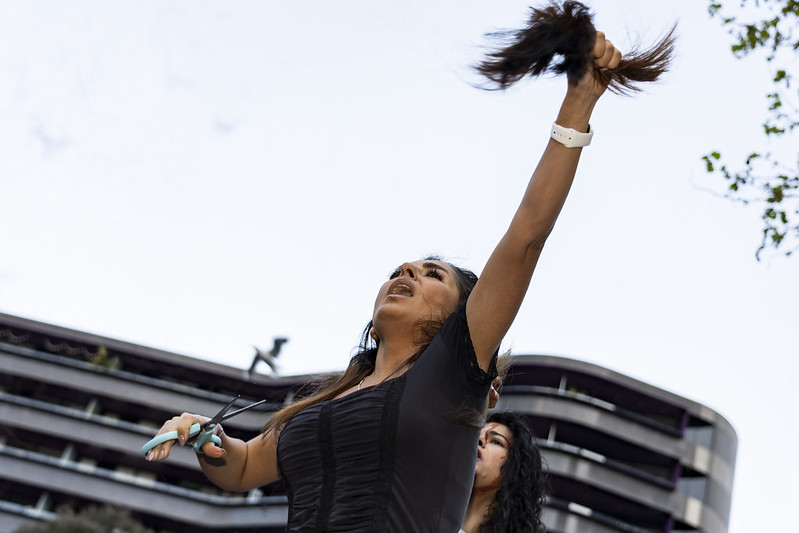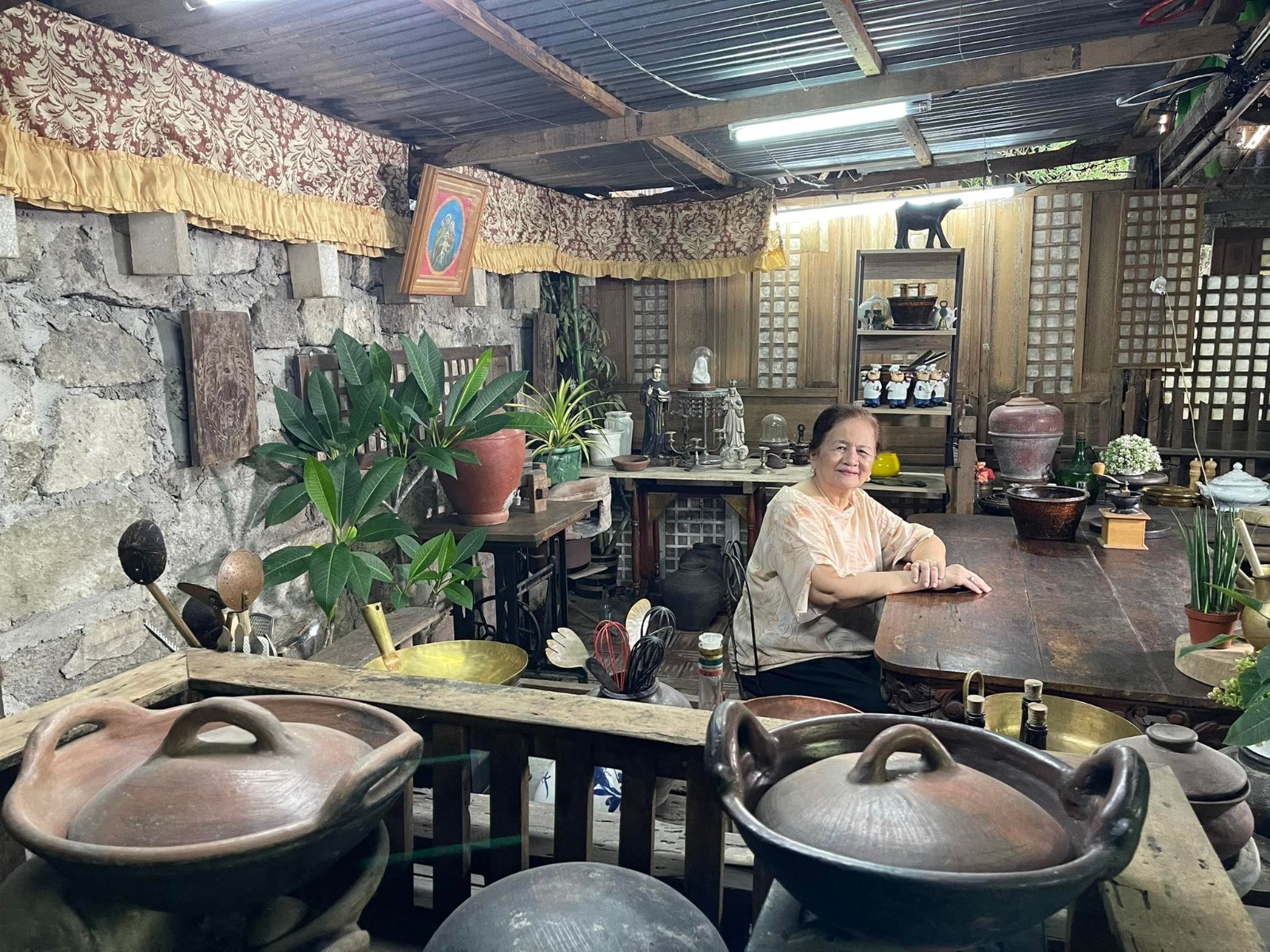Roxana Vilk: Finally, the world is seeing the real Iranians
"The end of the regime would be the ideal outcome. Stopping the killing of demonstrators would be an ideal outcome." The award-winning British-Iranian artist speaks to us about the ongoing uprising in Iran.
Roxana Vilk is a multi-award winning British/Iranain artist and performer whose CV reads like a bucket list of things aspirant artists want to achieve. Being born in Iran and raised in the UK since her teens has given her an outsider’s insider perspective on world issues because her local is our global. Her BBC film “Iranian Enough?” is a personal journey into her hyphenated self. As a filmmaker and journalist who spends a lot of time researching and running away from personal traumas, her intimate probe into her work and life is what got me talking to her.
“The questions started when I asked ‘how do I pass my heritage to my children if I can’t take them back to my motherland’,” Roxana stresses. “What am I sharing with them and am I creating an imaginary landscape that doesn’t exist? I’ll say I’m British and Iranian, half this and half that. But you can’t be half anything. I’m a living, breathing human being. Yet I excavate my Iranian side and make work around it because it is the side I feel I can’t access.
“My parents met in Iran and we came to the UK when I was sixteen. I feel like I’m constantly having to explain Iran to people - and that the people of Iran are not its government,” she says. She speaks with a learned freestyle flow, much like the music she creates with her band Vilk Collective. There’s a lot of freedom in the stories she tells and the points she makes, but there is a very defined structure that holds the improvisation together.
The intangibility of blood, something that flows inside you yet is rarely touched unless you’re wounded is like living in a wider diaspora. You know something is part of you but it takes cuts and pierces to take a closer look at it - and the minute you do, it changes and it’s outside you. The news of Mahsa Amini’s death shared amongst Roxana’s network took a similar form of intimacy and distance.
“I’m in a WhatsApp group with my very best Iranian friends scattered around the world. One of them posted it up and I remember feeling disbelief and wanting to be sick because I couldn’t compute what I was reading with any sense of it being real. We’re the diaspora - we’re the lucky ones because when we get off the plane in London, we can take the hijab off and feel the sun on our hair.
“I remember doing an arts project in Iran and meeting all these contemporary dancers who were busy making work but in basements hiding the word ‘dance’ under the more acceptable ‘harmonious movement’.
“Women aren’t allowed to sing solo. A dancer once told me she wanted to do a bungee jump because she wants to feel the wind against her skin. Imagine being a dancer but being forced to wear all this ‘stuff’. There’s a constant focus on what goes on with a woman’s body in a public space.”
When I ask people what they think of when I say 'Iran', they say 'nuclear.'
Being pulled over by Iran’s vice squad is no joke, and for some Western outlets to call them the “fashion police” diminishes their terror. Consisting of a green and white police van or car with male drivers and a clutch of women in chadors - a body-length, often black, semi-circle of cloth, that covers the head - they cruise the streets, barking at women who don’t adhere to the dress code imposed in the early 1980s in the Iranian Cultural Revolution. Not wearing a roosari on your head or a long enough manto as a coat can see you fined, land you in jail and beaten or - in many cases that have come to light since Amini’s treatment - death. There are other police cars with different colours - a blue and white one and a more ominous black one. I remember them as a constant presence in Tehran as a visitor - and part of a dual existence among Iranians.
“I often ask people who haven’t been to Iran what they think of when I say ‘Iran’,” Roxana continues. “They think of the word ‘nuclear’. They think of black and angry things like burning the American and Israeli flags, chanting ‘death to America’ and all these snippets of the surface of people’s lives because of isolationist policies and sanctions on Iran.
“I took a group of British artists with me to Iran as we co-created some new contemporary theatre as part of a festival there. We were in an official festival - everything you create has to be vetted - and we were in an official hotel. Everything was guarded. Workshops and rehearsals were all filmed to make sure we were doing everything correctly. Foreigners were seeing one side of Iran but I wanted to show them the other side.
“I took them to a party secretly one night and they were like ‘oh my gosh, this happens here???’. All the veils were off and everyone was doing everything you’d expect at a party [in London]. There is a public life and there is a private life. Because people exist through a whole set of complex codes, never the two shall meet.
“One positive thing about what's happening is that people around the world are getting a chance to see the real Iranians. You’re getting images of school children and incredible young people expressing themselves. You see the colour and diversity of youth - and that’s so great.
“What’s overlooked is that this is a feminist movement that’s linked to so many other feminist movements around the world. Technology has aided and abetted the spread of this movement and you wouldn't have thought of something like this happening back in the seventies or eighties this quickly.”
The Revolution will eat its children.
There have been on-and-off international sanctions on Iran since 1979. One side effect of this is a slightly warped idea of what goes on there. Our news is filtered through events, biases and outsider gazes. Those of us who have Iranian friends or who have been to Iran to witness slices of lives firsthand still bring our prejudices into the lens. Despite those privileges, and a seemingly constant barrage of social media hashtags and images, none of us can claim to know what’s really going on.
“Iranians are not what you see on the news - it’s how we’re represented. Our isolation since the revolution means it takes longer for stories like the hijab protest to hit the headlines and make front pages in the west. You still have to answer questions like ‘has the hijab always been a part of Iranian culture?’ I’m always telling my friends a potted history.
“One thing I’m always keen to explain is that when I think about my mother and my aunties in Iran during the revolution, they were wearing mini skirts and had their hair in high quiffs with hairspray - all 60s and 70s disco-esque. My mother was pregnant and going to demonstrations.”
Her friends are “gobsmacked” when she shows them family photos from that time. “Look, it wasn’t until the 1980s when the hijab was mandatory in law. In 1975, some of the most progressive family laws in the region were in Iran. Women were educated and were central to the revolution, yet it turned against them. This so-called God’s own government took the marriageable age of women from eighteen down to nine. Girls. It was a massive step backwards for women’s rights - and by that I mean human rights.”
She’s in touch with family in Iran as much as she can be - the internet and phone lines are often down or tightly controlled. During the 2009 Green Revolution, an artist took a known Nokia phone ad, stuck then-president Mahmoud Ahmadinejad’s face on it and changed the tag line to say “Nokia: Disconnecting People”.
“The difference now is, I think, that this movement is so diverse and widespread. There’s so much information being collected that it’s almost impossible to stop it all.”
A poem she wrote and filmed herself reciting on her Instagram, "The Revolution Will Eat its Children", has been viewed nearly 12,000 times.
“People on the streets of Iran face the real possibility of being shot. Or of being arrested and killed. It’s unbelievable the level of brutality people are facing - especially the children. I woke up one morning overwhelmed by everything I was seeing and reading. I wrote that poem with no idea that it would be viewed and shared by so many - people want to know what is going on and anything that we do in support of what protesters are trying to achieve will be seen by those who can still get online and it will resonate with them.
Organic protests seem to have a pattern: an injustice happens, people get angry and protest, the state or an authority kicks back, more protest occurs and it’s easy to get caught up in a cycle of reactive actions. Sometimes, they make international headlines - but there’s an expiry date to news cycles and we can already see the headline interest in Iran waning. Until the next terrible atrocity, that is. I ask Roxana what the ideal outcome would be.
“The end of the regime would be the ideal outcome. Stopping the killing of demonstrators would be an ideal outcome. I met a friend who was in prison in Iran who recently got out. She has firsthand experience of exactly what’s going on. She says that the regime can’t come back from this - this level of brutality and violence. But nobody knows how long it’s going to take.”
Roxana sent The Lead a list of links and hashtags in case you want to keep following this story - and amplify the voices on the ground. She says that it’s hard to work out what is happening - especially if you can’t speak Farsi - but these are some of the more accessible links.
For art and images from Iran around the demos, click here.
For up to date videos, head here and here.
For understanding and re-framing narratives around Iran, “this project is brilliant”.
Amnesty has a campaign and Iran Human Rights Dot Org does too.
And here are the hashtags you can follow on your social media channels:
#mahsaamini
#irandemonstrations
#womenlifefreedom
#zanzendegiazadi
#women_life_freedom
#opiran
#womensrights
#humanrights
See you on the streets and on the Internet.
Photo credit ©Cairo Sealey
The Lead is now on Substack.
Become a Member, and get our most groundbreaking content first. Become a Founder, and join the newsroom’s internal conversation - meet the writers, the editors and more.




